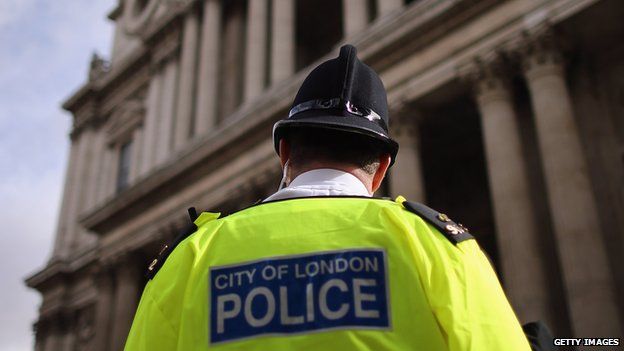City of London piracy police to be given more money
- Published

More money is to be given to the City of London Police's Intellectual Property Crime Unit (Pipcu).
The division deals exclusively with investigating digital piracy and counterfeited goods.
The unit will get an extra £3m so it can run until at least 2016. Since its 2013 launch, it has received £2.56m.
Pipcu says it has suspended 2,359 internet domain names and seized more than £1.29m worth of suspected fake goods since September 2013.
The latest action, on Thursday morning, saw a man, 55, and woman, 39, arrested in Bury for allegedly selling hard drives containing up to 200,000 counterfeited files.
Pipcu said the drives contained a mixture of karaoke tunes, full music tracks and music videos thought to be worth "more than £350,000".
Det Ch Insp Daniel Medlycott said: "Pipcu is committed to tackling individuals who think they can exploit others copyrighted material for their own financial gain, as crimes like these are costing our economy hundreds of millions of pounds."
Diverting traffic
Pipcu was set up in 2013 with the intention to "dismantle and disrupt" criminal activity relating to intellectual property theft.
Since then it says it has:
- suspended 2,359 internet domain names - replacing pages with a City of London Police notice
- seized more than £1.29m worth of fake goods
- diverted five million visits from copyright infringing websites to a Pipcu holding page
Pipcu has also set up an infringing website list (IWL) that acts as a database of sites deemed to be breaking copyright law.
This list is designed to be used as a resource for companies that place advertising on behalf of brands.
However some have raised concerns that lists of this nature - which do not require court approval - can result in over-blocking.
The new funding will come from the budget of the Intellectual Property Office - which is supported by the Department for Business, Innovation and Skills.
News of the additional money was welcomed by the Publishers Association.
Chief executive Richard Mollet said: "We have seen first-hand the important work the Pipcu team does in tackling the problem of pirate websites and the difference they are making in ensuring the online environment is one which is safe and secure for consumers and allows publishers and authors to be remunerated for their work."
Jim Cormack, a partner at law firm Pinsent Masons, requested serious consideration into how the money is spent.
He said: "The extra funding is very welcome but of course needs to be deployed effectively in further developing specialist police expertise in this area.
"If cases are to be successfully brought before the courts, then it is also vital that expert prosecutors are also available.
"It is key for law enforcement agencies to liaise effectively with technology owners to obtain information and evidence about their rights."
- Published3 September 2014
- Published1 September 2014
- Published7 August 2014
- Published29 July 2014